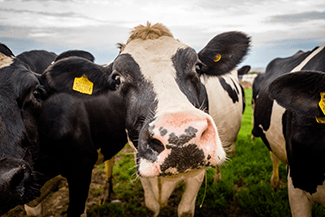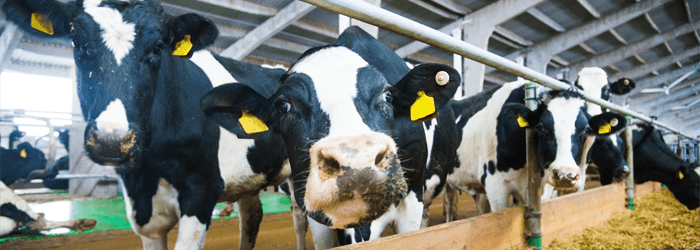Arizona Farm Fresh Dairy
When it comes to Arizona Agriculture, we turn to the experts at Arizona Farm Bureau to help guide us through the ins and outs! This time we are exploring the world of Arizona Dairy with the help of Julie Murphree, Arizona Farm Bureau Outreach Director! Tune-in to the podcast at the bottom of the page to learn more.
Our Arizona dairies produce some of the finest dairy products around and the best part – it’s local! Arizona dairies always place in the top three states in terms of quality dairy production. Our Arizona family dairy farms have nearly 200,000 milk cows to keep us well supplied with local dairy and the 96% of all Arizona homes that have milk in the fridge, thank them greatly.
In February 2017, the average milk production of our Arizona milk cows averaged 2,060 pounds or 8.55 gallons of milk per cow per day, according to the United States Department of Agriculture’s National Agriculture Statistical Services (NASS).
Arizona Dairy Farm Families as featured with the Arizona Farm Bureau. Some of them have also been featured guests on Rosie on the House’s Saturday radio broadcast:
-
-
- The Gladden Family (Dairy and Row Crops)
- Danzeisen Family (Dairy)
- Kerr Family (Dairy)
- Caballero Family (Dairy)
- Donald Van Hofwegen Family (Dairy)
-
Second leading agriculture commodity
 Arizona’s dairy industry is the second leading agriculture commodity in our state; it flips back and forth for the number one spot with Arizona beef. The Dairy industry alone, brought in nearly $800 million to Arizona in 2016, according to the USDA’s NASS. Keep in mind, this figure is not including what the labor and suppliers bring to the industry as well.
Arizona’s dairy industry is the second leading agriculture commodity in our state; it flips back and forth for the number one spot with Arizona beef. The Dairy industry alone, brought in nearly $800 million to Arizona in 2016, according to the USDA’s NASS. Keep in mind, this figure is not including what the labor and suppliers bring to the industry as well.
Top facts & FAQs about Arizona dairies & dairy cows
-
-
- How Big is Arizona’s Dairy Industry?
- Dairy rotates with beef at the top of our $23 Billion agriculture industry in Arizona. In 2018, Dairy beat out beef as the biggest agriculture commodity with $721 million in “cash receipts”, according to the United States Department of Agriculture.
- How many active Dairy Farms are in Arizona?
- Just under 100 family-owned commercial dairies.
- What’s the largest & smallest operation?
- Compared to the Midwest where it’s not unusual for a dairy to have no more than 150 cows, even the smallest dairy in Arizona is large. Our largest dairies can run about 10,000 active milk cows. Our smallest dairy farm has 850 milking cows.
- How Big is Arizona’s Dairy Industry?
-
From the Farmer: Milk production
-
-
- How do they raise their herd?
- With the latest nutritional and technological innovations in dairy cow management. Today’s dairy cows even have pedometers attached to each cow so farmers can track every step a cow takes. The data is uploaded every 15 minutes and a farmer, based on a cow’s activity, can determine exactly what’s happening with her. The data also allow them to predict problems!
- What cow breeds are best?
- The two most common breeds are the Holstein and Jersey in Arizona. Jersey cows have a higher fat content. Holstein is the most common breed and is known for its black-and-white spots.
- How old before they start producing?
- On average, dairy farmers usually aim for their heifers to become pregnant at around 15 months of age so that they give birth when they are around two years old. A cow must be in lactation in order to give milk, so a milking cow must give birth to a calf each year.
- What is done with all the manure?
- Dairy farms are daily managing manure including cleaning the cow pens. They recycle the manure for compost and other purposes. Some even employ methane digesters that can produce methane gas from the manure to generate electricity!
- How do you keep Arizona cows cool?
- Very carefully. Special barns, water misters, and fans help keep the cows cool. If they are heat stressed they’re not healthy and they will not produce as much milk. Arizona dairy farmers care about their cows and go to great lengths to keep them healthy and cool in Arizona.
- How do they raise their herd?
-
From Cow to Cup of Milk
There are many steps between getting the milk from the cow, to a nice cool glass on your table. That process begins with milking the cows and storing the milk in stainless steel storage containers that immediately chill the milk to 39 degrees Fahrenheit. Milk is collected from the farm every 24 hours in large tankers that keep the milk cold during transportation; I’m sure you’ve seen these going down the road a time or two. Once the milk is delivered to the processing plant, it is then pasteurized and homogenized before packaging to get ready for the grocery store.
- What does it mean for the milk to be pasteurized?
- Milk is pasteurized and bottled at a milk processing plant. In Arizona, one example is the United Dairymen of Arizona, a Co-op owned by the family dairies. Pasteurization is the process in which packaged and non-packaged foods are treated with mild heat (<100 degrees Celsius) to eliminate pathogens and extend shelf-life. The process is intended to kill pathogenic bacteria and make food safe to eat.
- What’s the difference in whole, 2%, & skim milk?
- The only difference between them is the amount of fat. Half the calories in whole milk come from fat and one-third of the calories in 2% milk come from fat.
- How is the expiration date calculated and how long after the expiration date is milk still “good” for?
- If you can store your milk for about five days after the sell-by date, subtract the current date from the sell-by date, add five, and you have the number of days your milk will be good for. Of course, the nose test works too.
- What brands do we look for to know we are supporting local dairy farms?
- 97% of the milk sold in our Arizona grocery stores comes from our Arizona family dairies. We have our well-known family local brands such as Danzeisen Dairy and Shamrock Dairy. That gallon of whole milk you just bought this week also came from a local dairy, it just doesn’t have the farm dairy brand slapped on the side of the package.
Sources : Arizona Farm Bureau, United Dairymen of Arizona, Arizona Milk Producers and Arizona’s dairy farmers.
Dairy Recipes:
 Smecknog | Eggnog Recipe
Smecknog | Eggnog Recipe- Jan D’Atri’s Leftover Eggnog Fudge
- Jan D’Atri’s Philly Fruit Clouds (June 2018 Recipe Of The Month)
For more information on all things Eggnog, visit here
Related Content: Farm Fresh: Arizona Dairy Products, Local and Available
Arizona Farm Bureau
Blog:
- The Most Interesting Facts About Arizona Dairies You’ll Ever Read
- Meet Arizona Agriculture’s Dairy Farmers
YouTube Videos:
City Slicker: The Udder Story
Beef and Dairy: Breeds Apart!
Drink Milk, Get Strong, Stay Healthy!
We’re Loco About Local Food!
The Faces of Arizona’s Dairy Farmers
###
Outdoor Living To-Do | #Dairy #ArizonaDairyProducts #AZDairy
PODCAST
The Arizona Farm Bureau’s Julie Murphree guest is Jen Millican of Stotz Dairy. Jen discusses how she got into dairy farming, cow care, the farm’s sustainability resources and why Arizona is the perfect place to produce the best most nutritious milk. With a few cow jokes tossed in too!
Podcast Archive With Expanded Content and Resources
__________
Arizona Farm Bureau’s Julie Murphree guests are Wes and Bill Kerr of Kerr Family Farms in Buckeye, AZ. They discuss the history of the family farm, the technology and genetics used from tracking to nutrition and sustainability that keep their dairy cows producing Arizona milk. Plus how to get their beef products direct from the farm.
__________
Arizona Farm Bureau’s Julie Murphree and special guest Tammy Baker, General Manager of Arizona Milk Producers join us. The dairy industry is a near billion dollar business. Dairy farmers keep a clean farm and land to produce nutritious milk found locally in stores. Tammy discusses the importance of milk in your diet, farm’s commitment to sustainability, how the expiration date is determined and ‘moooo’ore!
__________
June is Dairy Month! Julie Murphree of Arizona Farm Bureau and Kevin Danzeisen of Danzeisen Dairy discusses the process and procedures of how their milk goes from the cows to the store in glass bottles! (No cartons)
















